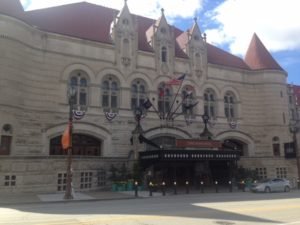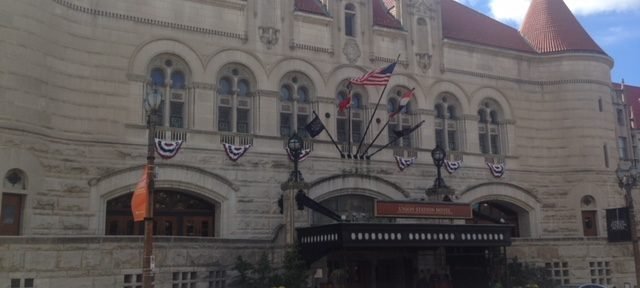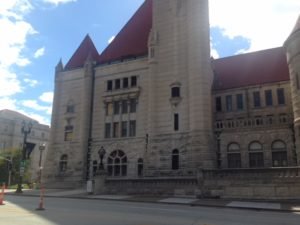The city of St. Louis, a part of the county of St. Louis, lies on the west bank of the Mississippi River just below its confluence with the Missouri. During westward expansion, St. Louis played a major role with transportation, communication and trade.
Thank you for reading this post, don't forget to subscribe!
The Early Years
St. Louis…A Major Railroad Crossroad
On September 1, 1894, the famous Union Station opened its doors in St. Louis. After a long building process with designs by Theodore Link, the station’s interior featured the Headhouse, a space originally used for the building’s first hotel with a dining space, The Midway, and a very large and long Train Shed. Built with limestone construction and 22 railroad tracks, Union Station quickly became the most monumental of its kind. It was estimated that 10,000 passengers per day stepped through Union Station’s doors to get to their arrival by the 1940s and an expansion was needed.Though demand for railroad travel was at its peak after the expansion, it unfortunately started to decline as the years progressed and air travel became a key component in traveler’s plans. By 1978 Union Station was essentially obsolete when Amtrak’s trains departed the station for the final time.
HOK global architecture and design firm, saw great opportunity in the station’s vast structure. With a $150 million renovation in August of 1985, the former railroad hub was made into a hotel with some 539 rooms, a shopping center, and several dining outlets. It wasn’t long before the splendor of the original Union Station was restored as it became a very busy center for travelers and native visitors alike.
The Whispering Arch
According to legend, the Whispering Arch was discovered during the building’s construction in 1890. One builder dropped a hammer, and another heard it—nearly 40 feet away. The phenomenon is like that in the whispering gallery of St. Paul’s Cathedral in London: Without attempting to, a vault had been constructed in such a manner that sound waves cling to and actually travel around its curve, heard at either end of a concave surface. Since the discovery the arch has been witness to marriage proposals and countless other secretive declarations.

The Whispering Arch is easy to find. It’s surrounded by beautiful, restored green and gold detailing and frames a stained Tiffany glass window featuring three robed women figures.
The women, clad in yellow, red, and green, also date from the station’s earliest days, and represent the largest and busiest train stations of the 1890s. At its peak, 22 railroads connected through St. Louis making Union Station the busiest railroad station in the United States.
See this additional Carthage, Missouri Trips Into History article found on the link below….
Today’s St. Louis Union Station Hotel
Visitors to St. Louis can stay at the historic St. Louis Union Station Hotel, a AAA-approved Four Diamond hotel known for its refined and stylish upscale attributes, extensive amenities and a high degree of hospitality, service and attention to detail.

With 65-foot ceilings and archways that reach to the sky, the Grand Hall houses the lobby lounge bar with a unique, dazzling 3D projected light show.
Among the frescoes, gold leaf detailing, and mosaics visitors will be awed by the Allegorical Window, a handmade stained glass window with hand-cut Tiffany glass features three women representing the main U.S. train stations during the 1890s — New York, St. Louis and San Francisco.
St. Louis Union Station Hotel is a member of Historic Hotels of America, the official program of the National Trust for Historic Preservation for recognizing and celebrating the finest historic hotels across America.
(Photos copyright Trips Into History)


